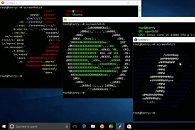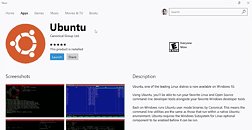Friday, May 12th 2017

Fedora, Ubuntu, and SuSE Linux Available from Windows Store
That's right, Microsoft could soon distribute Linux. Popular PC Linux distributions such as Ubuntu, Fedora, and SuSE, could soon be available through the Windows Store. Microsoft made this startling announcement at its Build 2017 keynote. The idea here is to make Linux distributions available to power-users who want to run the operating systems in virtual machines, or install the OS in a manner that lets you run Linux applications directly on Windows 10.
There are still limits to what you can do with Linux you get from the Windows Store. For starters, the OS can't be installed on the host machine, in say, a separate partition/volume, which you can choose to boot from, using a bootloader such as GRUB. The download also doesn't directly expose the .iso installer disk image of your Linux distro. It could still be useful for developers seeking a turnkey Linux environment instantly for development or testing, or for schools to teach Linux.
Source:
The Verge
There are still limits to what you can do with Linux you get from the Windows Store. For starters, the OS can't be installed on the host machine, in say, a separate partition/volume, which you can choose to boot from, using a bootloader such as GRUB. The download also doesn't directly expose the .iso installer disk image of your Linux distro. It could still be useful for developers seeking a turnkey Linux environment instantly for development or testing, or for schools to teach Linux.


22 Comments on Fedora, Ubuntu, and SuSE Linux Available from Windows Store
SQL Server runs on Linux, Mono, various integration projects.
I believe they are betting big on cloud services and they came to the conclusion that running *nix in datacenter is cheaper and more secure.
Only difference there is that Ubuntu will install directly from the Store, I assume, without the need to turn on dev mode, add Windows feature and so on.
Edit: For those who have no idea what is this. This picture sums it all up:
So the Linux userspace applications from Ubuntu, Fedora & SUSE aren't running virtualized or emulated or recompiled. They're running natively. There is effectively not a performance penalty--any penalty will be from Windows doing a specific process less efficiently than Linux.It's not really so people can run Linux but so people can use the Linux userspace tools without needing a separate system or VM.I was at Ignite (microsoft conference) last year. They as much as said they implemented this so that Azure developers can use a windows machine to manage the linux VMs without needing external tools like Putty.
" Great im shit at linux i could sort a virtual pc to learn it easier that way"
They do mention schools.
Unlike the author suggests, it's not just for testers and developers, because (opposite to what many believe) Linux is not just for administrators and GRUB fanboys.
It's great for typical users as well - simply because many, many productivity tools work better in a shell-driven environment. As a result, many PC users that wanted to stay on Windows for practical matters, went for a dual boot (IMO awful idea) or virtualization.
VMs are generally fine as long as you're fine with the encapsulated environment. It gets much less pleasant if you want to build a workflow on both the host and the VM or (even worse) on few VMs.
Microsoft has been going this direction for years now. They wanted to end the image of making software for office clerks. Just few examples: PowerShell (sadly didn't get the credit it deserves), Visual Studio, Bash in Windows, Microsoft R, SQL Server and now Linux integration. With every new release there are less and less reasons to go for a different OS.
And keep in mind this Linux VM can be way more interesting that what we usually get via Virtualbox or VMware. I'm not hoping for a seamless integration, but anything close to that would be a revolution and a revelation. :D